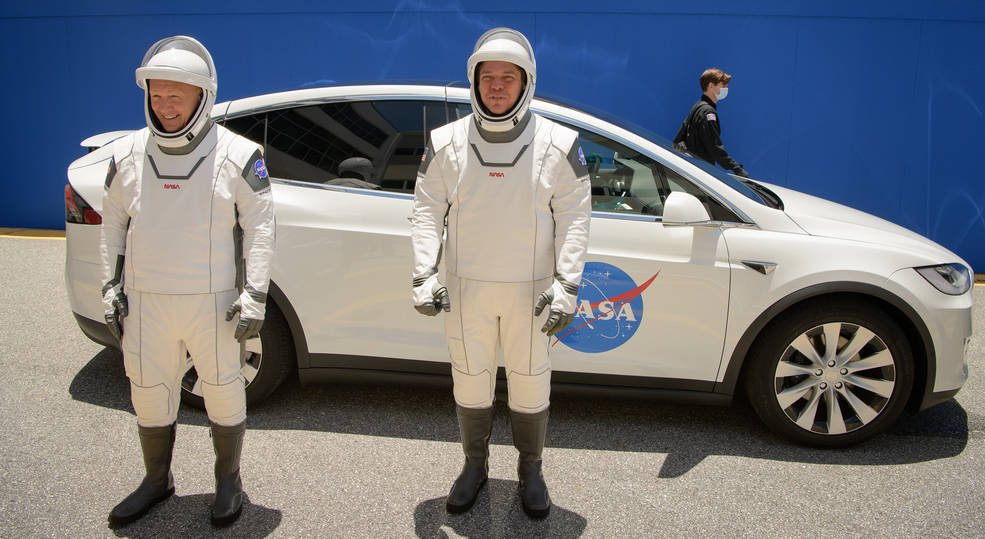Landmark #NASA SpaceX Commercial Crew Test Flight
New Delhi: NASA will provide live coverage of prelaunch and launch activities for the agency’s SpaceX Demo-2 test flight on Wednesday, May 27, carrying NASA astronauts Robert Behnken and Douglas Hurley to the International Space Station.
NASA and SpaceX are targeting 4:33 p.m. EDT May 27 for the launch of the first commercially-built and operated American rocket and spacecraft carrying astronauts to the space station. NASA and SpaceX will provide joint, live coverage from launch to arrival at the space station.
Full mission coverage will air live on NASA Television and the agency’s website, as well as numerous other platforms. The launch broadcast commentators are Marie Lewis, Dan Huot, Gary Jordan, Derrol Nail, and Tahira Allen from NASA, and Lauren Lyons, John Insprucker, and Jessie Anderson from SpaceX, with special guest host and former NASA astronaut Leland Melvin. Postlaunch coverage commentators are Leah Cheshier, Courtney Beasley, Gary Jordan and Dan Huot from NASA, and Kate Tice, Siva Bharadvaj, and Michael Andrews from SpaceX.
Prelaunch coverage also includes a special performance of “The Star-Spangled Banner” by Grammy Award-winning singer Kelly Clarkson.
The SpaceX Crew Dragon spacecraft will launch on a SpaceX Falcon 9 rocket from historic Launch Complex 39A at NASA’s Kennedy Space Center in Florida, and is scheduled to dock to the space station at 11:39 a.m. Thursday, May 28.
This will be SpaceX’s final test flight for NASA’s Commercial Crew Program and will provide critical data on the performance of the Falcon 9 rocket, Crew Dragon spacecraft, and ground systems, as well as in-orbit, docking, and landing operations.
The test flight also will provide valuable data toward certification of SpaceX’s crew transportation system for regular flights carrying astronauts to and from the space station. SpaceX currently is readying the hardware for the first space station crew rotational mission, which would happen after data from this test flight is reviewed for certification.
Due to the coronavirus (COVID-19) pandemic, all media participation in news conferences will be remote. Only a limited number of media will be accommodated at Kennedy. For the protection of media and Kennedy employees, the Kennedy Press Site News Center facilities will remain closed to all media throughout these events.
To participate in the briefings by phone, reporters must e-mail [email protected] no later than two hours prior to each event.
Live NASA coverage is as follows. All times are EDT:
Wednesday, May 27
- 12:15 p.m. – NASA TV launch coverage begins (continues through docking)
- 4:33 p.m. – Liftoff
- 5:22 p.m. – Crew Dragon phase burn
- 6:05 p.m. – Far-field manual flight test
- 7:05 p.m. – Astronaut downlink event from Crew Dragon
- 7:30 p.m. – Administrator postlaunch news conference at Kennedy
- Administrator Bridenstine
- Kathy Lueders
- SpaceX representative
- Kirk Shireman
- NASA Chief Astronaut Pat Forrester
A media phone bridge will be available for this event. Launch commentary will switch to NASA TV’s Media Channel.
Thursday, May 28
- 7:20 a.m. – Astronaut downlink event from Crew Dragon
- 11:39 a.m. – Docking
- 1:55 p.m. – Hatch Open
- 2:25 p.m. – Welcome ceremony
- 4:15 p.m. – Post-Arrival News Conference at Johnson
- Administrator Bridenstine
- Mark Geyer, director, NASA’s Johnson Space Center
- NASA Chief Astronaut Pat Forrester
Friday, May 29
- 11:05 a.m. – Space Station crew news conference, with NASA astronauts Chris Cassidy, Bob Behnken, and Doug Hurley
- 12:50 p.m. – SpaceX employee event and Class of 2020 Mosaic presentation, with NASA astronauts Chris Cassidy, Bob Behnken, and Doug Hurley
The deadline for media to apply for accreditation for this launch has passed, but more information about media accreditation is available by emailing [email protected].
This test flight is a pivotal point in NASA’s Commercial Crew Program, which is working with the U.S. aerospace industry to launch astronauts on American rockets and spacecraft from American soil to the space station for the first time since 2011.
The goal of the Commercial Crew Program is to provide safe, reliable, and cost-effective transportation to and from the International Space Station. This could allow for additional research time and increase the opportunity for discovery aboard humanity’s testbed for exploration, including preparation for human exploration of the Moon and Mars.
For launch countdown coverage, NASA’s launch blog, and more information about the mission, visit:

